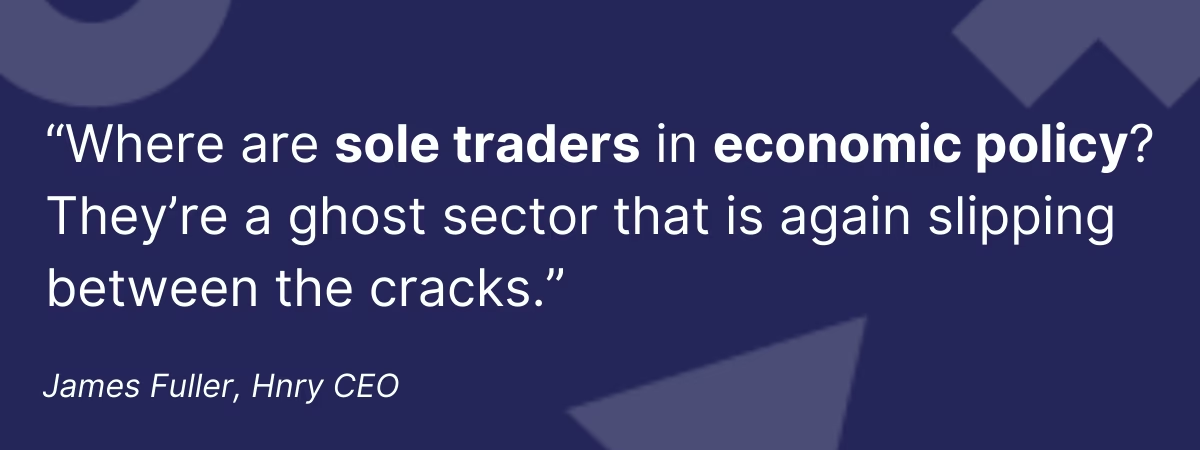For more, you can listen to this RNZ interview with Hnry CEO James Fuller, or read the release on their website.
Here at Hnry, we take our position as an advocate for the sole trader community very seriously.
Which is why we canvassed all major political parties on what policies they had that specifically addressed the needs of sole traders. We wanted to:
- know that our community is being considered in campaign promises,
- make sure sole traders are recognised and acknowledged publicly and politically, and
- prepare our users for any potential incoming changes.
But what we discovered is that political parties across the spectrum don’t understand sole traders at all.
A sector underserved
Despite sole traders being 20% of the workforce (and around 400,000 potential voters), all the major political parties ‘failed the assignment’.
Firstly, we only got responses from ACT, Greens, Labour, National, and TOP – Te Pāti Māori and New Zealand First both declined to respond.
Secondly, the answers we did receive were “a level playing field of mediocrity that is woeful, inept, and out-of-touch,” says Hnry CEO James Fuller.
“No one understood who sole traders are and what they do,” he says. “They either lumped sole traders in with small businesses (despite them belonging to different groups), or shoehorned their policies to answer our questions, but completely missed the mark.”
Neither National nor Labour committed to differentiating sole traders in the Census (who are not currently separately defined) or were able to provide directly targeted tax or financial policies.

The Greens committed to free mental health services for sole traders, and while both ACT and TOP agreed to include sole traders in the next Census, their other promises – like a simplified tax structure and streamlined ‘systems’ – are generally irrelevant to sole traders.
“ACT bizarrely raised ram raids as a concern for sole traders, even though they’re unlikely to own or operate a brick-and-mortar business,” says James. “Recent reports on our economy predict tougher times ahead, so we need an incoming government who understands the vital role sole traders play, and who will implement measures directly benefiting those who need it most.”
Furthermore, the pledges from National and Labour to cut back on public ‘contractors and consultants’ appear to apply to both regular sole-trader contractors, and expensive consultants brought in from high-charging global consulting firms. This will have a real knock-on effect for the local sole-trader community.
“A sole trading business analyst working for a government organisation is very different to teams of people deployed from the big four global consulting firms,” says James. “People working in hands-on roles, from finance, to HR, public-facing and policy roles will be casualties of what is essentially a dog whistle policy.”
Aotearoa compared globally
It’s not an unreasonable request; a number of OECD countries already recognise the value sole traders bring to economic growth, and without targeted help, New Zealand’s sole traders are falling further behind. For example:
- Australia has grants specific to sole traders.
- Canada allows sole traders to claim special benefits when taking maternity leave from self-employment.
- France runs an effective micro-enterprise tax scheme with differing effective tax rates for sole traders.
- Luxemburg gives sole traders and freelancers credits on their income tax.
- Ireland allows self-employed traders to claim an earned income tax credit of €1,775, or a tax credit worth 20% of qualifying earned income, whichever is lower (around $3,000 NZD).
This is in stark contrast to what sole traders can currently claim in New Zealand – as little as $10 a week.
Hnry processes nearly 1% of the entirety of New Zealand’s tax revenue on behalf of tens of thousands of sole traders. Despite their significant economic contribution, the sole trader sector’s needs are being ignored.
“This was the opportunity for all parties to put their best foot forward, and tell sole traders how they will specifically support them,” says James. “No one met the brief. Where are sole traders in economic policy? They’re a ghost sector that is again slipping between the cracks.
“If the people vying for votes want some suggestions, there are three things they can immediately do:
- Introduce an appropriately geared minimum living wage for sole traders
- Facilitate an increase in the Independent Earner Tax Credit, and
- Provide targeted tax relief for sole traders
“We regularly take the pulse of the sole trader sector, and understand what they need to succeed and grow in the current economic climate,” James says. “Our door is open and we’re always prepared to meet with ministers or MPs who are ready to step up and help the sole trader sector.”
Hnry’s latest Sole Trader Pulse Survey found that 30% of sole traders reported mortgage stress, 77% are cutting costs to deal with inflation, and 92% are avoiding taking on additional debt.
Share on: